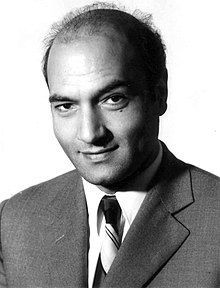Shariati
| Ali Shariati | |
|---|---|
 |
|
| Native name | علی شریعتی |
| Born |
Ali Shariati Mazinani 23 November 1933 Kahak, Iran |
| Died | 18 June 1977 (aged 43) Southampton, United Kingdom |
| Resting place | Sayyidah Zaynab Mosque, Damascus, Syria |
| Nationality | Iranian |
| Alma mater |
Ferdowsi University of Mashhad Sorbonne |
| Occupation | Sociologist, Historian |
| Years active | 1952–1977 |
| Employer | Ferdowsi University of Mashhad |
| Organization | Hosseiniye Ershad |
| Political party | Freedom Movement of Iran |
| Spouse(s) | Pouran Shariat Razavi |
| Children | Ehsan, Sousan, Sara and Mona |
| Parent(s) | Mohammad-Taqi Shariati Zahra Amini |
Coordinates: 33°26′42.13″N 36°20′28.98″E / 33.4450361°N 36.3413833°E
Ali Shariati Mazinani (Persian: علی شریعتی مزینانی, 23 November 1933 – 18 June 1977) was an Iranian revolutionary and sociologist who focused on the sociology of religion. He is held as one of the most influential Iranian intellectuals of the 20th century and has been called the 'ideologue of the Iranian Revolution'.
Ali Shariati (Ali masharati) was born in 1933 in Kahak (a village in Mazinan), a suburb of Sabzevar, found in northeastern Iran. His father's family were clerics. His father, Mohammad-Taqi, was a teacher and Islamic scholar, who opened in 1947 the 'Centre for the Propagation of Islamic Truths' in Mashhad, in the Khorasan Province, a social Islamic forum which became embroiled in the oil nationalisation movement of the 1950s. Shariati's mother was from a small land-owning family. His mother was from sabzevar, a little town near mashhad.
In his years at the Teacher's Training College in Mashhad, Shariati came into contact with young people who were from the less privileged economic classes of the society, and for the first time saw the poverty and hardship that existed in Iran during that period. At the same time he was exposed to many aspects of Western philosophical and political thought. He attempted to explain and provide solutions for the problems faced by Muslim societies through traditional Islamic principles interwoven with and understood from the point of view of modern sociology and philosophy. His articles from this period for the Mashhad daily newspaper, Khorasan, display his developing eclecticism and acquaintance with the ideas of modernist thinkers such as Jamal al-Din al-Afghani, Sir Allama Muhammad Iqbal of Pakistan, among Muslims and Sigmund Freud and Alexis Carrel.
...
Wikipedia
